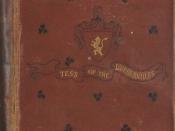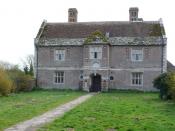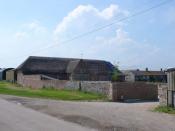The roles of rustic characters in Tess of the D'urbervilles are used in many concepts to express Tess' superiority in the book. Throughout the novel Hardy emphasis his love of the character Tess, he has always made Tess stand out, for example in the opening when we first meet Tess she is described as the most beautiful dancer their but he has also added the red ribbon so she stands out in the crowd of white dresses.
Tess of the D'urbervilles, like the other major works by Thomas Hardy, anticipates the twentieth century in regard to the nature and treatment of its subject matter.
Tess is the twelfth novel published by Hardy. He began the novel in 1889 it was rejected by several other periodicals from July to December 1891. It was finally published in December 1891.
The novel questions societies sexual mores by compassionately portraying a heroine who is seduced by the son of her employer and who thus is not considered pure and chaste women by the rest of the society.
Upon its publication, Tess encountered brutally hostile reviews; although it is now considered a major work of fiction, the poor reception of Tess and Jude the Obscure precipitated Thomas Hardy's transition from writing fiction to poetry.
Tess of the D'urbervilles deals with several significant contemporary subjects for Hardy, including struggles of religious belief that occurred during Hardy's lifetime Hardy was largely influenced by the Oxford movement a spiritual movement involving extremely devout thinking and actions. Hardy's family members were primarily orthodox Christians and hardy himself considered entering the clergy, as did many of his relatives. Yet hardy eventually abandoned his devout faith in god based on the scientific advances of his contemporises, including most prominently Darwin's on the origin of species. Hardy's own religious experiences...



Tess of the D'urbervilles
Thank you for a great essay on Thomas Hardy's classic novel. You have done a really good job in analyzing Hardy's use of symbolism and his presentation of rustic characters in Tess of the D'urbervilles. Your essay is thorough, well written, and clearly presented. Excellent work!
8 out of 8 people found this comment useful.